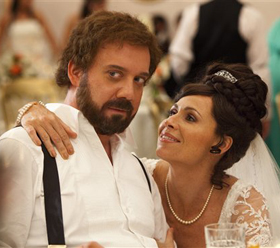     
|
A Confession
David Bezmozgis | February 23, 2011 |

Paul Giamatti and Minnie Driver.
Richard,
I’m not a Talmudist, but in my recollection of the Talmud—which I was exposed to only as an adolescent in a Toronto Hebrew school—there were many rabbis engaging in debates, often across generations. Sometimes they agreed, sometimes they disagreed, and sometimes they agreed to disagree—the latter was my favorite, as it was personified by my Hebrew teacher holding both hands palms up and speaking the philosophical word Teiku. (I think the literal translation is tie. No overtime. No shootout.) Maybe some of the debates ended with “Why not?” but I don’t remember those. Although I feel like I know a half dozen Jewish jokes that end that way.
Certainly from an industrial, practical perspective, I get what you mean about the film business needing good stories to feed through the story mill. Good stories are hard to find. It’s true, too, that the film industry has traditionally turned to books and movies—now comic books—for material. Witness the two writing categories in the Academy Awards: Best Original Screenplay and Best Adapted Screenplay. You’ll get no argument from me about the practice being fundamental to the medium, but that still doesn’t quite explain why it is so. And I’ll grant you also that people love to tell and hear the same stories. Children particularly love to hear the same stories repeated. I couldn’t count the number of times I’ve read If You Give a Mouse a Cookie ... to my two-year-old daughter. But there’s still something different about the impulse to transmute a story from one form to another. Besides, if we just liked repetition, we would reread the same book over and over again. (Other than the Bible, does any other book get that kind of treatment? And besides, people don’t read the Bible the way they read The Great Gatsby.) And though there’s more of a tendency now to adapt movies into stage productions, that process seems to me to be artificial. I don’t think anyone—other than an opportunistic theater producer—comes out of a movie and says, That would make an awesome play! Yet people who comes out of plays, and close the covers of books, often say, That would make a great movie! My take—merely on the conceptual level: Movies are an elastic form. Depending on ingenuity and budget, they can stretch to match the proportions of a person’s imagination. For example, space travel in a play or an opera will always feel simulated, but that isn’t true of movies.